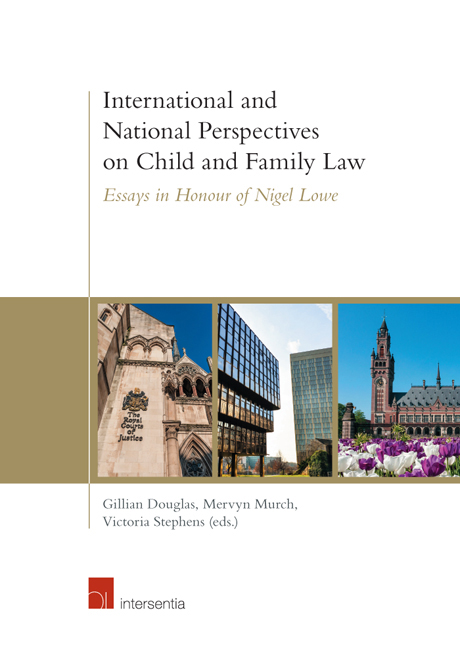Book contents
- Frontmatter
- Foreword
- Acknowledgements
- Contents
- List of Cases
- List of Contributors
- Introduction: Nigel Vaughan Lowe: An Appreciation
- Part I Family and Child Law in England and Wales
- Part II International Family Law
- Judging Parental Child Abduction: What Does it Mean to Adopt a Children's Rights-Based Approach?
- Judicial Activism: A 20-Year Evolution
- Globalisation of Adjudication in International Family Law: Serving International Families by Producing International Solutions
- Creating International Families: Private International Law and the Industry of Parenthood
- Issues in International Divorce Cases
- Non-Judicial Divorce in France: Progress or a Mess?
- The Istanbul Convention: Is Domestic Abuse Violence Against Women?
- Nationality and Migration Status in International Children's Law
- The Development of Child Protection Across International Borders for Children at Risk of Harm
- Nigel Lowe and International Family Law: An Immense Contribution
- The Spanish Constitutional Court and Protracted Child Abduction Proceedings: Time is of the Essence
- Non-Recognition of Child Marriages: Sacrificing the Global for the Local in the Aft ermath of the 2015 ‘Refugee Crisis’
- Juvenile Justice in Bulgaria: Reforms and Resistance
- Overriding Mandatory Provisions in EU Family Law Regulations
- Part III The Future for Family and Child Law
Non-Judicial Divorce in France: Progress or a Mess?
from Part II - International Family Law
Published online by Cambridge University Press: 12 October 2018
- Frontmatter
- Foreword
- Acknowledgements
- Contents
- List of Cases
- List of Contributors
- Introduction: Nigel Vaughan Lowe: An Appreciation
- Part I Family and Child Law in England and Wales
- Part II International Family Law
- Judging Parental Child Abduction: What Does it Mean to Adopt a Children's Rights-Based Approach?
- Judicial Activism: A 20-Year Evolution
- Globalisation of Adjudication in International Family Law: Serving International Families by Producing International Solutions
- Creating International Families: Private International Law and the Industry of Parenthood
- Issues in International Divorce Cases
- Non-Judicial Divorce in France: Progress or a Mess?
- The Istanbul Convention: Is Domestic Abuse Violence Against Women?
- Nationality and Migration Status in International Children's Law
- The Development of Child Protection Across International Borders for Children at Risk of Harm
- Nigel Lowe and International Family Law: An Immense Contribution
- The Spanish Constitutional Court and Protracted Child Abduction Proceedings: Time is of the Essence
- Non-Recognition of Child Marriages: Sacrificing the Global for the Local in the Aft ermath of the 2015 ‘Refugee Crisis’
- Juvenile Justice in Bulgaria: Reforms and Resistance
- Overriding Mandatory Provisions in EU Family Law Regulations
- Part III The Future for Family and Child Law
Summary
INTRODUCTION
Who could have predicted that in 2016 France would open a new path for consensual divorce in which the family judge would no longer have a role to play? Nobody expected such a radical change so soon.
In 1998, sociologist Irène Thé ry suggested introducing non-judicial divorce. But it was too early for such a radical change.
In 2007, it was suggested that the notary public should record the consensual divorce of spouses. But in 2008 the Guinchard Commission on desirable justice reforms did not support this proposal, as they considered that it would hinder the important task of the family judge to protect the weaker spouse and the minor children.
A new suggestion was made in 2013 by the D elmas-Goyon report ‘L e juge du 21 e me si e cle’. The report suggested that consensual divorce should be granted by a new greffier juridictionnel (a new position that did not yet exist); this would be a high-ranking court clerk to whom some judicial functions should be transferred in order to relieve the judges of part of their workload. They could grant consensual divorce (divorce par consentement mutuel) notwithstanding the existence of minor children of the spouses and without regard to the composition of the spouses’ assets (immovable property, etc.). According to proposal n o. 47, this new greffier juridictionnel would also have to scrutinise the spousal agreement, at the time of divorce, with regard to the fairness of the divorce consequences and the child's best interest. Scholars criticised this proposal.
Because of this history, nobody expected new discussions so soon about a possible out-of-court divorce. When the Draft Bill on Justice in the Twenty-First Century was presented by the former minister of justice, Christiane Taubira, not a single provision mentioned non-judicial divorce, since divorce did not initially fall within the scope of the Draft Bill. However, after the Bill was brought before Parliament (on 31 July 2015), the Ministry of Justice presented numerous subsequent amendments. One of them suggested the introduction of a non-judicial consensual divorce. On 12 July 2016, the Parliamentary Assembly (Assemblée Nationale) passed the law on the modernisation of justice of the twenty-first century. In October 2016, the Second Chamber (Sénat) withheld consent regarding non-judicial consensual divorce in cases where the spouses have minor children.
- Type
- Chapter
- Information
- International and National Perspectives on Child and Family LawEssays in Honour of Nigel Lowe, pp. 193 - 204Publisher: IntersentiaPrint publication year: 2018



